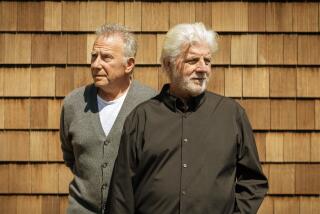A Real Rhapsody in (NYPD) Blue
- Share via
“Cop stories are at root really just family stories, filled with secret conflicts, shame, desire and humor, only dressed up with sirens and flashing lights,” Brian McDonald writes in his 1999 memoir of three generations of New York City policemen, “My Father’s Gun.” “They deserve to be told, no matter the risk.”
Tonight at 9 on the History Channel, the McDonald family tales continue in a two-hour “documovie” of the same name that goes beyond adaptation, giving insight into the making of the book and how its publication has affected the protagonists. Perhaps most remarkable of all, the show more than compensates for the loss of nuance when translated from printed page to film by adding fresh layers all its own.
The program, as does the book, traces 100 years in the NYPD through the lives of McDonald’s maternal grandfather, Tom Skelly, who struggled to stay honest in the corrupt days of Tammany Hall; the author’s father, Frank McDonald, squad commander of the detective bureau in the Bronx’s infamous Fort Apache precinct and a pioneer of the first “cop land” in the Pearl River suburb; and the author’s brother Frankie, a rough-and-tumble sort skilled at “picking the perp” yet torn over how to do the right thing.
Even if you’ve read these fascinating tales of triumph and tragedy, there’s still reason to tune in, if only to hear them retold by McDonald, who narrates in a smoky New York accent. His father and brother also recount their own stories, updating them for a post-Sept. 11 world, and in some cases clarifying or correcting the book.
Indeed, McDonald’s written account, especially the details in Frankie’s life, did not sit well with relatives. And though he’s been forgiven, it’s apparent that the author, a journalist, will always remain a kind of outsider, no matter how close his ties to the police world.
Still, “My Father’s Gun” is a deeply personal and insightful work, as book or documovie. The latter--a format melding documentary interviews, archival footage and dramatizations “with special attention given to historical accuracy”--could have been a disastrous mishmash. But producer-director Phil Tuckett deftly holds the line between fiction and the book’s facts.
As Frankie tells his brother while the cameras roll: “Why lie? I got enough truthful stories to tell.”
More to Read
Sign up for our Book Club newsletter
Get the latest news, events and more from the Los Angeles Times Book Club, and help us get L.A. reading and talking.
You may occasionally receive promotional content from the Los Angeles Times.








